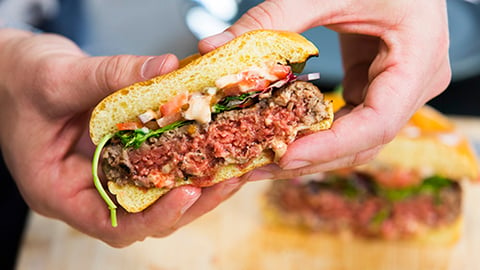Impossible Foods Cuts Retail Prices
Thanks to its tremendous growth over the past year, plant-based meat maker Impossible Foods has achieved cost savings that it wants to pass along by cutting suggested retail prices by 20% throughout the United States.
The alternative meat company is strongly encouraging the roughly 17,000 grocery stores, supermarkets and retailers that sell its signature product, the Impossible Burger, to pass the savings on to consumers as soon as possible.
“While we would not and could not require grocery stores to cut prices, grocery store customers and distributors are in fact consistently passing along our economies of scale to their own customers,” said Dennis Woodside, president of Redwood City, California-based Impossible Foods. “Impossible products are becoming increasingly affordable, and this in turn is accelerating our rapid retail growth. It’s a virtuous cycle for our customers, consumers and the planet.”
The price cuts bring the company’s suggested retail prices for Impossible Burger to $5.49 for patties and $6.99 for a 12-ounce package. On-shelf prices may vary depending on location and retailer.
“Some companies cut prices only when they have lower-than-expected sales,” wrote Woodside in a recent blog post. “On the contrary, we’re dropping our prices amid record demand for our products. Our stated goal since the founding of the company has always been to drive down prices through economies of scale, reach price parity and then undercut the price of conventional ground beef from cows, and that’s exactly what we’re doing.”
While still a relatively small segment of the traditional meat category, the plant-based meat alternative segment experienced a robust growth in 2020, upwards of 80%, according to Anne-Marie Roerink, president of San Antonio, Texas-based 210 Analytics.
Impossible Foods definitely filled a growing need for plant-based products in 2020, after retailers experienced meat shortages during the height of pandemic stockpiling. It even entered the direct-to-consumer space with an e-commerce site.
The Impossible Burger was sold in about 150 grocery stores one year ago; it’s now available in approximately 17,000 grocery stores nationwide — a more than 100-fold increase in Impossible Foods’ retail footprint. Production has even increased six-fold since 2019.
In addition to skyrocketing retail growth of Impossible Burger, 2020 marked the debut of Impossible Foods’ first products in an all-new category: Impossible Pork Made from Plants and Impossible Sausage Made from Plants. Time magazine named Impossible Pork one of the best inventions of 2020.
“Our plan is to reverse global warming and halt our planet’s extinction crisis by making the food system sustainable. To do that, we need to make meat better in every way that matters to consumers — taste, nutrition, convenience and affordability,” said Impossible CEO and founder Dr. Patrick O. Brown. “With economies of scale, we intend to keep lowering prices until we undercut those of ground beef from cows. Today’s price cut is merely our latest — not our last.”
Impossible Foods is also introducing similar price cuts internationally at retail stores in Canada, Singapore and Hong Kong. The double-digit international price cuts, which vary by location and apply to all Impossible retail products sold overseas, exceed 20% in some regions.
This latest price cut is actually the third double-digit price reduction from Impossible Foods in less than a year. Last month, the company cut prices on average by about 15% for foodservice distributors that sell to restaurants.
Privately held Impossible Foods was founded in 2011 as a producer of alternative meat and dairy products. Its scientists’ best-known achievement to date is the plant-based Impossible Burger, which launched in retail stores in September 2019. It contains no animal ingredients, animal hormones or antibiotics. According to the company, it uses 96% less land, 87% less water and generates 89% fewer greenhouse gas emissions compared with conventional beef from cows — environmental benefits that also translate to economic efficiencies.
Investors of Impossible Foods include Khosla Ventures, Bill Gates, Google Ventures, Horizons Ventures, UBS, Viking Global Investors, Temasek, Sailing Capital and Open Philanthropy Project. The plant-based company said that it raised $200 million in its funding round in August 2020, led by New York-based new investor Coatue Management LLC.






